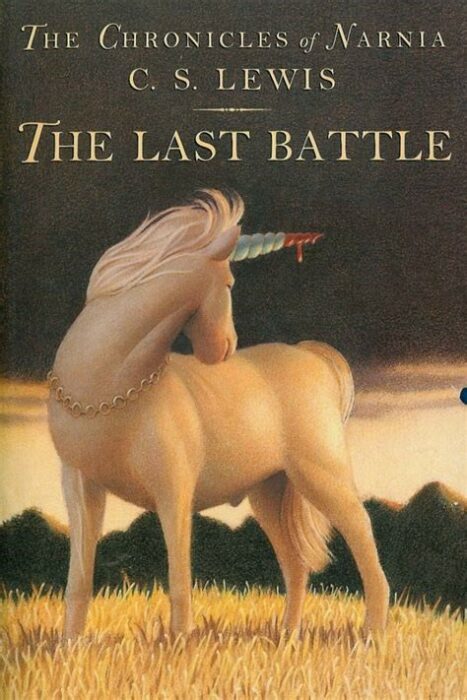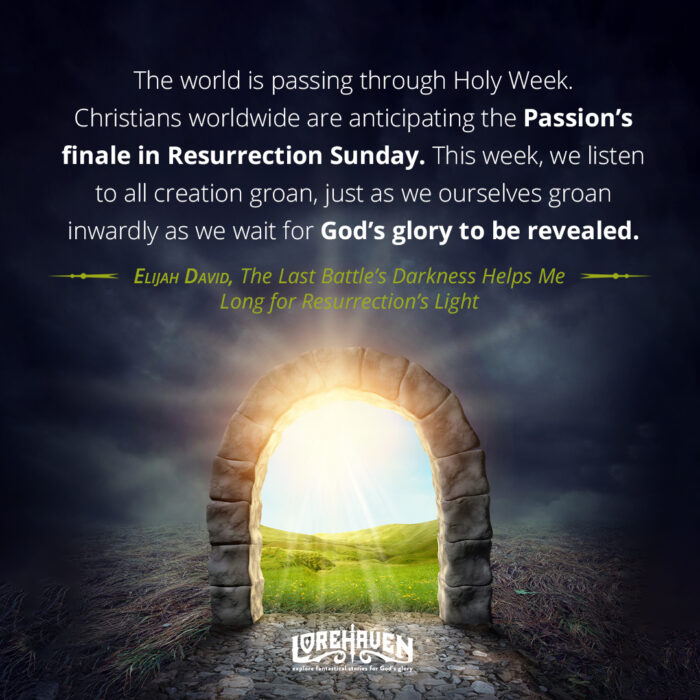The Last Battle’s Darkness Helps Me Long for Resurrection’s Light
When I explored in January how The Magician’s Nephew taught me Christ’s compassion in the midst of grief, I knew my Nana’s earthly life was nearing its end.
This month, she passed from the Shadowlands and into the Real Narnia.
I’ve already wanted to explore The Last Battle and the Resurrection, but it felt almost dishonest to do this before she passed. I felt I might not be able to explore this topic while we still waited for “the end,” which of course is only another beginning.
Yet now, as my family members adjust to this new reality where the vacuum of loss accompanies us every day, I find I can truly say this—I long for the Resurrection, the glorious revealing of the New Heavens and New Earth, as much as ever. This is a longing given voice by Jewel the Unicorn in the New Narnia:
“I have come home at last! This is my real country! I belong here. This is the land I have been looking for all my life, though I never knew it till now. The reason why we loved the old Narnia is that it sometimes looked a little like this.”1
The Last Battle contrasts profound loss and soul-deep hope

The Last Battle’s opening and middle chapters are rife with moments of loss. Dryads are felled by enemies in Lantern Waste. Tirian is captured by Calormenes. Scores of Narnian Horses are slain by the arrows of traitorous dwarfs.
These losses culminate in the death of the old Narnia, when stars fall from the sky and the world is swallowed up in water and darkness.
All creatures left in the world turn either toward Aslan and the New Narnia or into that darkness. Apart from Aslan’s death in The Lion, the Witch and the Wardrobe, this is perhaps the Chronicles’ darkest point—the dark night of mourning after Christ’s crucifixion, when all heaven’s plans seem (from our perspective) to come to naught.
But Lewis does not leave us in the night. There is, as Tolkien would say, a eucatastrophe, a sudden, joyful turning. Just as Christ did not stay in the tomb, Narnia itself finds renewal and fulfillment in its true form beyond the Stable door. This renewed Narnia is what causes Jewel’s pronouncement of coming home. It’s a sentiment echoed later in Lewis’s Till We Have Faces:
“The sweetest thing in all my life has been the longing—to reach the Mountain, to find the place where all the beauty came from—my country, the place where I ought to have been born. Do you think it all meant nothing, all the longing? The longing for home? For indeed it now feels not like going, but like going back.”2
Personal losses can lead to passionate longing
When I was in middle school, one of our elderly deacons, with whom I’d shared a precious friendship, passed away. This was the deepest loss I’d known since my biological grandfathers had died. I remember mourning that week, not only for Brother Billy, but also for my grandfathers. For years afterward, I didn’t cry. For a while, I thought I had cried all the tears I ever could in that week.
On the Sunday following the funeral service, I began imagining what it would be like to have Brother Billy and my grandfathers returned to me. I pictured them not as they lived in their final earthly moments—broken, weak, and diseased—but as they would be in Heaven, young and strong and filled with the light of Christ.
In the words of Digory in The Last Battle, I saw these men “unstiffened.” With a clarity rare for my mental pictures, I saw all three men walk into the sanctuary and place their hands on my shoulders.
At the time, I insisted this picture came from my own imagination. But in recent years, this image of them walking through the church has often returned to me. It has become a vision the Spirit uses to comfort my soul, a personal connection to the “great cloud of witnesses” mentioned in Scripture.3
For I consider that the sufferings of this present time are not worth comparing with the glory that is to be revealed to us. For the creation waits with eager longing for the revealing of the sons of God. For the creation was subjected to futility, not willingly, but because of him who subjected it, in hope that the creation itself will be set free from its bondage to corruption and obtain the freedom of the glory of the children of God. For we know that the whole creation has been groaning together in the pains of childbirth until now. And not only the creation, but we ourselves, who have the firstfruits of the Spirit, groan inwardly as we wait eagerly for adoption as sons, the redemption of our bodies.
(Romans 8:18–23, ESV)
‘The dream is ended: this is the morning’
I am still processing Nana’s death. This time it feels different than the day my grandfather passed three years ago. As I type these words, the world is passing through Holy Week. Christians worldwide are anticipating the Passion’s finale in Resurrection Sunday. This week, we listen to all creation groan, just as we ourselves groan inwardly as we wait for God’s glory to be revealed.4
I think it’s appropriate to pass through the dark nights of Maundy Thursday, Good Friday, and Holy Saturday, even as we pass through the shadow of a loved one’s death. We know that on darkness’s other side lies Easter Sunday. Beyond the darkness of this fallen world lies the bright morning of the Resurrection.
Or, to borrow Lewis’s own scene that concludes the Chronicles of Narnia:
“The term is over: the holidays have begun. The dream is ended: this is the morning.”
And as He spoke He no longer looked to them like a lion; but the things that began to happen after that were so great and beautiful that I cannot write them. And for us this is the end of all the stories, and we can most truly say that they all lived happily ever after. But for them it was only the beginning of the real story. All their life in this world and all their adventures in Narnia had only been the cover and the title page: now at last they were beginning Chapter One of the Great Story which no one on earth has read: which goes on forever: in which every chapter is better than the one before.5
Photo by Ingo Stiller on Unsplash
Read all Elijah David’s complete series I’ll Never Grow Too Old For Narnia:
- In Sixth Grade, I Learned the Secret Meaning Behind ‘The Lion, the Witch and the Wardrobe’
- I Love Beholding the Old Stories Coming True in ‘Prince Caspian’
- Joining Lewis’s ‘Voyage of the Dawn Treader’ Taught Me How to Sail for Aslan’s Country
- Jill’s and Eustace’s Journey to ‘The Silver Chair’ Taught Me Faith and Obedience
- Shasta’s Meeting with Aslan in The Horse and His Boy Helped Me Embrace God’s Sovereignty
- The Magician’s Nephew Taught Me Christ’s Compassion in the Midst of Grief
- The Last Battle’s Darkness Helps Me Long for Resurrection’s Light






























It reminds me a bit of the scene at the end of the Silver Chair where Caspian has died, but he comes back to life to go help Jill and Eustace take care of the bullies.